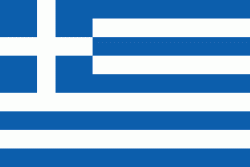Genisea (Genisséa)
Genisea (Γενισέα) is a town in the Vistonida municipal unit, within the municipality of Abdera in the Xanthi regional unit of Greece. It is the seat of the municipality Abdera. According to the 2011 census, the population of Genisea was 2,185 inhabitants.
Genisea was ruled by the Ottoman Empire from 1478 to 1912, and was known as Yenice; more specifically Karasu Yenicesi (after the Nestos River, Mesta Karasu) or Tütün Yenicesi ('tobacco'), to distinguish it from Yenice-i Vardar (modern Giannitsa). In the Ottoman tax registry of 1519 (Hijri 925) the town was recorded as Yenice-i Karasu, and was inhabited only by Muslims (215 households and 124 unmarried men); it was in the jurisdiction of Kasım Paşa, and it was also a hass, directly owned by the Sultan.
Under the spellings "Yenidje" or "Yenidze", Genisea was famous for its superior Oriental tobacco, especially suited for cigarettes. It lent its name to the Yenidze tobacco factory building in Dresden and to the British Yenidje Tobacco Company Limited.
Genisea was ruled by the Ottoman Empire from 1478 to 1912, and was known as Yenice; more specifically Karasu Yenicesi (after the Nestos River, Mesta Karasu) or Tütün Yenicesi ('tobacco'), to distinguish it from Yenice-i Vardar (modern Giannitsa). In the Ottoman tax registry of 1519 (Hijri 925) the town was recorded as Yenice-i Karasu, and was inhabited only by Muslims (215 households and 124 unmarried men); it was in the jurisdiction of Kasım Paşa, and it was also a hass, directly owned by the Sultan.
Under the spellings "Yenidje" or "Yenidze", Genisea was famous for its superior Oriental tobacco, especially suited for cigarettes. It lent its name to the Yenidze tobacco factory building in Dresden and to the British Yenidje Tobacco Company Limited.
Map - Genisea (Genisséa)
Map
Country - Greece
 |
 |
| Flag of Greece | |
Greece is considered the cradle of Western civilization, being the birthplace of democracy, Western philosophy, Western literature, historiography, political science, major scientific and mathematical principles, theatre and the Olympic Games. From the eighth century BC, the Greeks were organised into various independent city-states, known as poleis (singular polis), which spanned the Mediterranean and the Black Sea. Philip II of Macedon united most of present-day Greece in the fourth century BC, with his son Alexander the Great rapidly conquering much of the ancient world, from the eastern Mediterranean to the North Western parts of India. The subsequent Hellenistic period saw the height of Greek culture and influence in antiquity. Greece was annexed by Rome in the second century BC, becoming an integral part of the Roman Empire and its continuation, the Byzantine Empire, which was culturally and linguistically predominantly Greek.
Currency / Language
| ISO | Currency | Symbol | Significant figures |
|---|---|---|---|
| EUR | Euro | € | 2 |
| ISO | Language |
|---|---|
| EN | English language |
| FR | French language |
| EL | Greek language |















